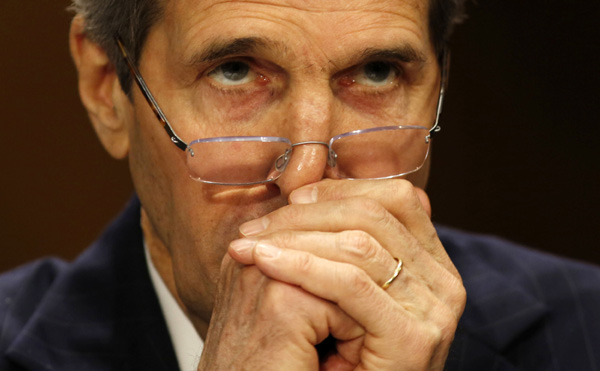Troubled Mideast peace effort compounds US policy woes
(Agencies) Updated: 2014-04-09 10:31
|
 |
|
US Secretary of State John Kerry testifies at the Senate Foreign Relations Committee while on Capitol Hill in Washington, April 8, 2014. [Photo/Agencies] |
WASHINGTON/RIYADH - Addressing the United Nations General Assembly in September, President Barack Obama declared the pursuit of Israeli-Palestinian peace one of the two main US foreign policy priorities for his second term.
Fast-forward to today, the Obama administration faces a stark choice: expend more energy on a faltering peace process or absorb the hit to an already-troubled record in the Middle East and walk away from negotiations.
Secretary of State John Kerry, who met Obama on Tuesday for a "reality check," says he hopes both sides will work with US mediators to "find a way back." But as optimism fades, many inside and outside the Middle East warn now is not the time for a US diplomatic failure in the region.
"A collapse of the peace process would only add to the perception that we really don't know what we're doing," said Aaron David Miller, a former US peace negotiator.
Asked to what extent US credibility would be damaged if the peace process failed, Mustafa Alani, a senior adviser at the Gulf Research Center think tank who has close ties to Saudi security officials, suggested Arab expectations of Washington were already about as low as they could get.
"That's because Arabs never trusted this administration as a peacemaker," he said.
But a senior US official insisted any decision on Middle East diplomacy would hinge not on US prestige but on whether it serves national interests and aids regional stability.
While successive administrations have come up dry in decades of Israeli-Palestinian peacemaking, the latest initiative faces trouble at a delicate time as Washington seeks to weather criticism for not doing enough to curb Syria's civil war and engages in high-stakes nuclear talks with Iran.
On top of that, US inaction over the military's tightening grip in Egypt, upheaval in post-Gaddafi Libya and renewed sectarian bloodshed in Iraq have raised questions about the administration's broader Middle East agenda.
Polls show attitudes toward the United States languishing in much of the Arab world, where Obama once promised a "new beginning" in relations with Washington after his predecessor, George W. Bush, was widely reviled because of the Iraq war.
Doubts about the Obama administration's ability to broker Israeli-Palestinian peace and an overall lack of confidence in its leadership in the region appear widespread, even though US officials insist that Washington's influence remains solid.
Even among Israelis, who count on the United States as their closest ally, Kerry's peace bid continues to be a tough sell.
"John Kerry took this issue very seriously," said Moshe Arens, a former Israeli foreign and defense minister who also served as ambassador to Washington. "But my guess is he did not really understand the reality of the area."
Kerry faced an even harsher assessment when he testified on Capitol Hill on Tuesday. "You can't help but get the impression that our foreign policy is simply spinning out of control," Senator James Risch, an Idaho Republican, told Kerry, who gave an impassioned defense of the administration's record.










